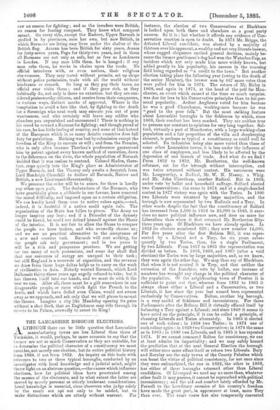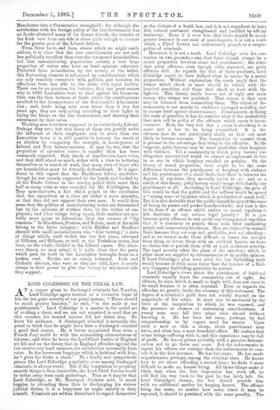THE LANCASHIRE BOROUGH ELECTIONS.
ALTHOUGH there can be little question that Lancashire manufacturing towns are less Liberal than those of Yorkshire, it would, perhaps, be more accurate to say that the former are not so much Conservative as they are unstable, for to determine the political character of a constituency we must consider, not merely one election, bat its entire political history from 1868, if not from 1832. An inquiry on this basis with reference to two or three typical boroughs, conducted by an investigator with local knowledge and a judicial mind, might throw light on an abstruse question,—the causes which influence elections, how far political ideas have penetrated among the masses of the electorate, and to what extent the latter are moved by merely personal or utterly irrelevant considerations. Local knowledge is essential, since observers who judge solely by the result are apt not only to be misled, but to make distinctions which are utterly without warrant. For
instance, the election of two Conservatives at Blackburn is looked upon both there and elsewhere as a great party success. So it is ; but whether it affords any evidence of Con- servative reaction is open to doubt. In 1874 Mr. Briggs, the defeated Liberal candidate, was elected by a majority of thirteen over his opponent, a wealthy and not very literate brewer, whose rugged eloquence excited general derision, mainly be- cause the former gentleman's dog had won the Waterloo Cup, an incident which not only made him more widely known, but added greatly to his popularity, his success in the coursing field being regarded as "a credit to the town." But another election taking place the following year (owing to the death of the senior Member), the brewer won by 467 more votes than were polled for him in 1874. The return of Mr. Birley in 1868, and again in 1874, at the head of the poll for Man- chester, an event which caused at the time so much surprise, was due far less to his Conservative principles than to his per- sonal popularity. Ardent Anglicans voted for him because he was a good Churchman, working-men because he was "good to the poor folk." But the most striking feature about Lancashire boroughs is the fickleness by which, since 1868, their conduct has been marked. They are neither true to persons nor constant to opinions for very long together. Sal- ford, virtually a part of Manchester, with a large working-class population and a fair proportion of the villa and shopkeeping element, is perhaps as typical a constituency as could well be selected. Its industries being also more varied than those of some other Lancashire towns, it is less under the influence of one class of employers, and less likely to be affected by the depression of one branch of trade. And what do we find ? From 1832 to 1852, Mr. Brotherton, the well-known reformer, sat for the bilrough without interruption, and was twice returned without contest. His successors were Mr. Langworthy, a Radical, Mr. W. N. Massey, a Whig, and Mr. John Cheetham, another Radical. But in 1868, under vote by ballot and household suffrage, Salford elected two Conservatives ; the same in 1874, and at a single-handed contest in 1877 victory was again with the Tories. In 1880 two Liberals were returned by large majorities, and the borough is now represented by two Radicals and a Tory. In other words, despite the fact that the constituency of Salford has increased from 1,500 in 1832 to 25,000 in 1885, it exer- cises no more political influence now, and does no more for Liberalism than when it first returned Mr. Brotherton fifty- three years ago. Of Blackburn we have already spoken. In 1832 its electors numbered 626; they now number 14,000. For five years after the first Reform Bill, it was repre- sented by a Liberal and a Tory, for six years subse- quently by two Tories, then, for a single Parliament, by two Liberals. From 1857 to 1865 the representation was divided as before. In 1865, 1868, and 1869 (after a void election) the Tories won by large majorities, and, as we know, they won again the other day. We may thus say of Blackburn that when it is not neutral it is Tory, and that neither the extension of the franchise, vote by ballot, nor increase of numbers has wrought any change in the political character of the population. Of the neighbouring town of Preston it is sufficient to point out that, whereas from 1832 to 1865 it always chose either a Liberal and a Conservative, or two Liberals, it has since the year last named been represented exclusively by Conservatives. Bolton, another big borough, is a very model of fickleness and inconsistency. For three Parliaments after the Reform Bill it virtually effaced itself by balancing a Tory against a Liberal; mid since 1849 it seems to have acted on the principle, if it can be called a principle, of choosing Liberals and Tories alternately. In 1865 it elected one of each colour ; in 1868 two Tories ; in 1874 one of each colour again ; in 1868 two Conservatives; in 1874 the same as in 1865; in 1880 two Liberals, and in 1885 it has repeated 1874. If we cannot commend Bolton for consistency, vie can at least admire its impartiality ; and we may safely hazard the prediction that at the next General Election the borough will either once more efface itself or return two Liberals. Bury and Burnley are the only towns of the County Palatine which can boast the virtue of political consistency, for not once since they were enfranchised, the one in 1832, the other in 1868, has either of these boroughs returned other than Liberal candidates. Of Liverpool we need say no more than, whatever other fault it may possess, it cannot be reproached with political inconsistency ; and the aid and comfort lately afforded by Mr. Parnell to the hereditary enemies of his country's freedom have made the great port, in appearance at least, more Tory than ever. Tb.e same cause has also temporarily converted Manchester into a Conservative stronghold ; for although dis- satisfaction with the fcreign policy of the late Government has no doubt alienated many of its former friends, the transfer of the Irish vote from one side is alone quite enough to account for the greater part of the Liberal defeats.
From these facts, and from others which we might easily adduce, it is clear that the new constituencies are not only less politically steadfast than were the ten-pound householders, but that manufacturing populations contain a very large proportion of voters who have no fixed opinions whatever. Protected from intimidation by the secrecy of the ballot, this fluctuating element is influenced by considerations which are only remotely connected with politics, and transfers its affections from one side to the other with equal facility. There can be no question, for instance, that one great reason why in 1880 Lancashire Went BO dead against the Conserva- tives was the then badness of trade, which the constituencies ascribed to the incompetency of the Beaconsfield Administra- tion; and, trade being now even worse than it was five years ago, they are only acting according to their lights in laying the blame on the late Government, and showing their resentment by their votes.
Working. men have been supposed to be instinctively Liberal. Perhaps they are ; but very many of them are greatly under the influence of their employers, and in more than one Lancashire town it is still possible to forecast the result of an election by comparing the strength, in horse-power, of Liberal and Tory factory-masters. It may be, too, that the proportion of operative voters is smaller than has been commonly supposed. Only heads of families can have votes, and they shift about so much, either with a view to bettering themselves or in search of work, that many even of those who are householders must be virtually disfranchised. It is signi- ficant in this regard that the Blackburn labour candidate, though he was warmly supported by the bands and backed by all the Trades Unions in the county, polled little more than half as many votes as were recorded for Mr. Coddington, the Tory manufacturer, a fact which points to the conclusion that the operatives as a class are either a mere minority, or that they did not support their own man. It would thus seem that the politics of manufacturing towns are determined less by the opinions of workers than by the wishes of em- ployers; and other things being equal, little masters are pro- bably more prone to Liberalism than the owners of "big concerns." In Blackburn, Preston, and Bolton, most of the mills belong to the latter category ; while Halifax and Bradford abound with small manufacturers who hire turning ;" a state of things which, until within the last few years, obtained at Oldham, and Oldham, as well as the Yorkshire towns, has been, on the whole, faithful to the Liberal cause. But what- ever theory we May adopt, it is quite clear that the party which puts its trust in the Lancashire boroughs leans on a broken reed. Parties are so evenly balanced. lush and Catholic electors, who vote as they are told, have it nearly always in their power to give the victory to whichever side they support.







































 Previous page
Previous page